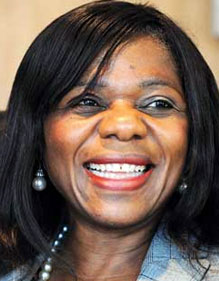|
Getting your Trinity Audio player ready...
|
 Our hero this week is (again) public protector Thuli Madonsela, who held her nerve in the midst of a storm of controversy and argument over her Nkandla investigation, refused to be intimidated by twitchy government officials, and produced a report that media reports have said walks a fine line “remarkably well”.
Our hero this week is (again) public protector Thuli Madonsela, who held her nerve in the midst of a storm of controversy and argument over her Nkandla investigation, refused to be intimidated by twitchy government officials, and produced a report that media reports have said walks a fine line “remarkably well”.
On the one hand she could have come down hard on President Jacob Zuma and demanded that he pay for all the upgrades, and on the other she could bowed to the pressure, exonerated him (and incurred the wrath of millions of South Africans).
Instead, she gave him the opportunity to save face, without letting him off the hook entirely, and in the process she probably earned more co-operation from him than she would have from a harder approach. This means a winning situation in the long run, because more-co-operation means a greater likelihood that the flaws and inadequacies pointed out by Madonsela in her report will be fixed.
But it’s been a tough road to travel for the public protector and her team. They faced immense criticism, threats to litigate, and had to weather a leak in November of the provisional report, which led to more pressure.
In April 2013 the ministers of the security cluster jointly tried to put a stop to the report, on the basis of what they regarded as security concerns. “Most of these, turned out, by the admission of the Task Team assigned to work with my team to assess the report in question, to be concerns unrelated to security,” Madonsela revealed.
The provisional report leak was another hurdle. “The journalist responsible for the article [in The Star newspaper, giving details of the leaked report] later told me at a media briefing that his information came from two senior government officials of the security cluster,” said Madonsela. “My team and I were especially offended by insinuations that the leak originated from my office and that I had personally admitted to the leak.”
Then there was the threat of a criminal investigation by the national police commissioner, who was unconcerned about three other supposed leaked provisional reports in the last week of November 2013 – she was interested only in preventing the release of the Nkandla report.
Madonsela refused to budge. “The National Commissioner was also referred to the provisions of section 6(8) of the Public Protector Act in terms of which the Public Protector and her/his staff are not compellable to answer any questions in proceedings before a court of law or any other body or institution, in connection with information relating to any investigation, and that I was not willing to be subjected and to subject any of my staff to her investigation.”
These various threats caused discomfort among members of the investigating team, said Madonsela, as they were seen as intimidation and victimisation.
“I was also concerned about the fact that some members of Parliament, charged with the duty to hold my office to account, while protecting it from undue attacks, joined in the unfair and unwarranted mudslinging.”
But Madonsela and her team worked on undeterred, and on 10 March the final report was officially released. For her commitment to her job and to her staff, and her determination to hold public officials to account, Thuli Madonsela is our hero of the week.



